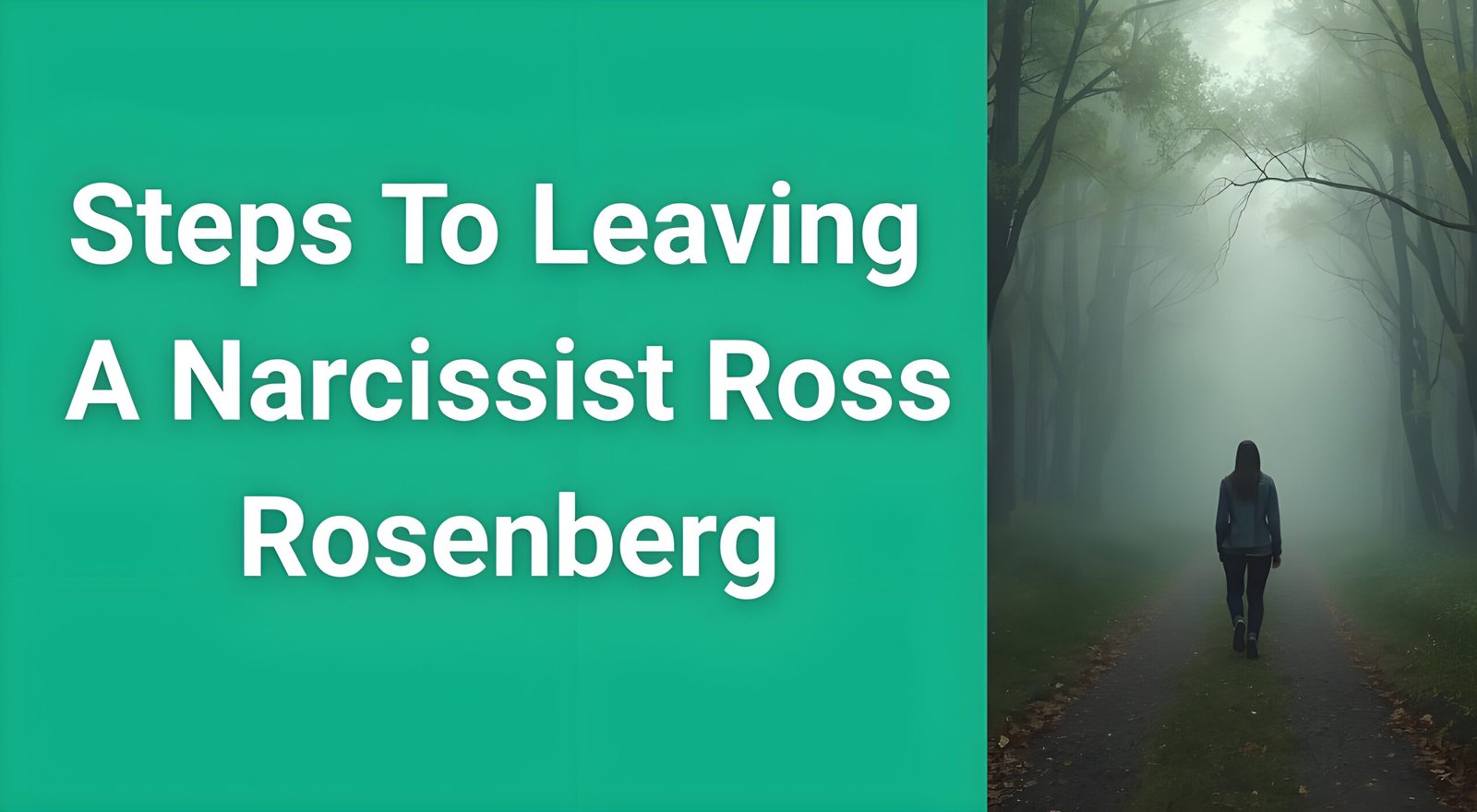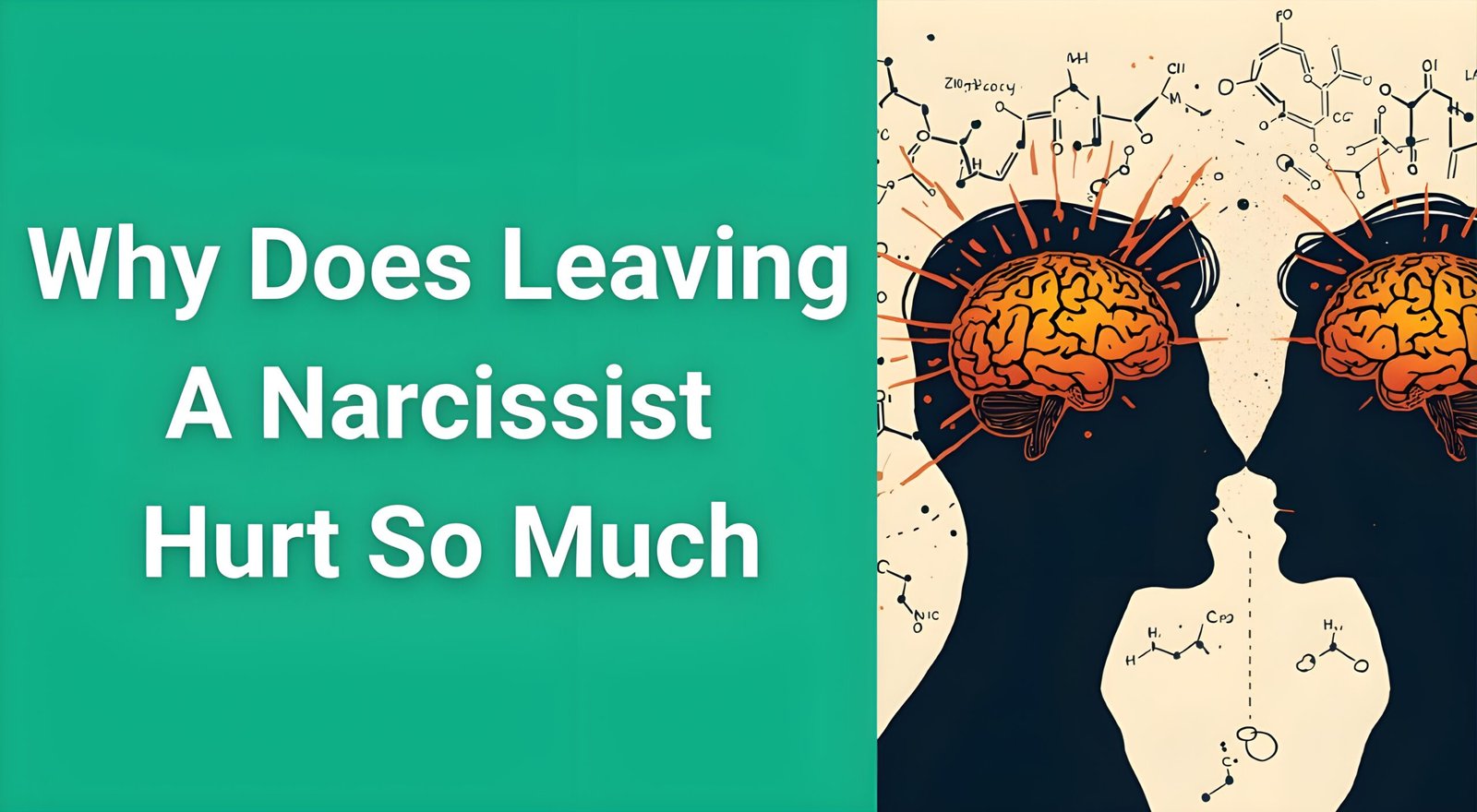If you’re reading this, you’ve probably asked yourself “Why does leaving a narcissist girlfriend feel so impossible?” countless times. You’re not alone, and more importantly, you’re not weak. The truth is that leaving a narcissist girlfriend operates on an entirely different level than ending a normal relationship, involving complex psychological mechanisms that make escape feel genuinely impossible.
- Why Leaving a Narcissist Girlfriend is Different
- Understanding the Invisible Chains: Trauma Bonding
- Signs It’s Time to Leave Your Narcissist Girlfriend
- When You Can’t Leave Right Now
- The Complete Guide to Leaving a Narcissist Girlfriend
- What to Expect When You Leave
- After Leaving: Your Recovery Journey
- Frequently Asked Questions
- Conclusion
The difficulty of leaving a narcissist girlfriend isn’t just about love or attachment—it’s about neurological addiction, systematic manipulation, and the deliberate erosion of your sense of reality. Understanding why it feels impossible is the first step toward making it possible.
Why Leaving a Narcissist Girlfriend is Different
Breaking up with a narcissistic partner involves challenges that don’t exist in healthy relationships. While ending any relationship can be difficult, narcissistic abuse creates unique psychological barriers that can trap even the strongest individuals.
The Manipulation Web
Your narcissist girlfriend hasn’t just been your partner—she’s been systematically rewiring your brain through intermittent reinforcement. This psychological technique, where affection and cruelty alternate unpredictably, creates addiction-like neural pathways stronger than those formed by cocaine use.
Reality Distortion
Through gaslighting and emotional manipulation, your narcissist girlfriend has likely convinced you that your perceptions are wrong, your memories are faulty, and your emotional responses are overreactions. This systematic reality distortion makes it nearly impossible to trust your own judgment about whether leaving is necessary.
Isolation Tactics
Narcissistic partners excel at gradually isolating their victims from support systems. Your girlfriend may have subtly turned you against friends and family, making you believe they don’t understand your relationship or that they’re somehow against your happiness.
Understanding the Invisible Chains: Trauma Bonding
The most insidious aspect of narcissistic relationships is trauma bonding—a psychological phenomenon that creates intense emotional attachment through cycles of abuse and intermittent positive reinforcement. This isn’t love; it’s a neurological addiction that hijacks your brain’s reward system.
How Trauma Bonds Form
Trauma bonding occurs when your brain associates your narcissist girlfriend with both extreme pain and relief from that pain. During abusive episodes, stress hormones flood your system. When she shows kindness afterward, your brain releases dopamine and oxytocin, creating a powerful chemical reward cycle.
Breaking the Addiction Cycle
Recognizing trauma bonding is crucial for breaking free. Your attachment to your narcissist girlfriend isn’t evidence of love—it’s evidence of psychological manipulation. Understanding this can help you realize that the intense pull you feel toward her is manufactured, not genuine.
For those struggling with trauma bonds, structured recovery programs can provide the neurological rewiring necessary to break free. Professional guidance through this process often accelerates healing and prevents relapse into toxic patterns.
Signs It’s Time to Leave Your Narcissist Girlfriend
Recognizing when a relationship with a narcissistic partner has crossed the line into irreparable territory requires looking beyond the good moments to the overall pattern of behavior.
Consistent Pattern of Abuse
If your girlfriend regularly engages in emotional manipulation, gaslighting, or controlling behaviors, these patterns typically escalate rather than improve. Narcissistic personality traits are deeply ingrained and rarely change without intensive professional intervention.
Loss of Self-Identity
When you find yourself constantly questioning your memories, feelings, or perceptions, your sense of self has been significantly damaged. Healthy relationships build you up; narcissistic ones systematically tear down your confidence and self-worth.
Walking on Eggshells
If you’ve developed a constant state of hypervigilance around your girlfriend, carefully monitoring your words and actions to avoid triggering her rage, you’re living in survival mode rather than in a loving partnership.
Isolation from Support Systems
When friends and family have expressed concerns about your relationship or when you find yourself making excuses for your girlfriend’s behavior to others, it’s often a sign that outsiders can see what you’ve been conditioned to overlook.
When You Can’t Leave Right Now
Sometimes leaving a narcissist girlfriend immediately isn’t possible due to practical constraints like shared living situations, financial dependence, or other circumstances. If you’re in this position, know that you can still take steps to protect your mental health while planning your exit.
Survival Strategies
Focus on maintaining your emotional equilibrium through techniques like grey rock method (becoming uninteresting to avoid triggering abuse), documenting incidents for clarity, and secretly rebuilding your support network.
Safety Planning
Develop a comprehensive safety plan that includes secure communication methods with trusted friends, emergency funds in a separate account, and a clear exit strategy for when the time is right.
Building Inner Strength
Use this time to rebuild your sense of self through journaling, meditation, or other practices that help you reconnect with your authentic thoughts and feelings.
For those who must remain in toxic situations temporarily, specialized guides for surviving narcissistic relationships when leaving isn’t immediately possible can provide crucial strategies for maintaining psychological safety.
The Complete Guide to Leaving a Narcissist Girlfriend
Phase 1: Mental and Emotional Preparation
Accept the Reality
The hardest part of leaving a narcissist girlfriend is accepting that she won’t change. Your hope for improvement, your investment in the relationship, and your belief in her potential for growth are actually obstacles to your freedom.
Document the Abuse
Keep a private record of incidents involving emotional manipulation, gaslighting, or other abusive behaviors. This documentation serves two purposes: it helps you maintain clarity about reality, and it provides evidence if needed for legal proceedings.
Reconnect with Your Support Network
Quietly rebuild relationships with friends and family members. If your girlfriend has successfully isolated you from everyone, consider joining support groups or online communities for narcissistic abuse survivors.
Phase 2: Practical Preparation
Financial Independence
If you’re financially dependent on your narcissist girlfriend, begin quietly building your independence. Open a separate bank account, start saving money, and ensure you have access to your important documents.
Secure Housing
Arrange alternative living arrangements before announcing your intention to leave. Whether staying with friends, family, or finding your own place, having somewhere safe to go is crucial.
Legal Consultation
If you share assets, have children together, or if there’s any potential for legal complications, consult with an attorney who has experience with high-conflict divorces or breakups.
Phase 3: The Departure
Plan Your Exit Conversation
When you’re ready to leave your narcissist girlfriend, keep the conversation brief and factual. Don’t explain all your reasons—this only provides ammunition for manipulation. Simply state that the relationship is over and you’re leaving.
Execute Quickly
Once you’ve announced your decision, leave as quickly as possible. Prolonged conversations give your girlfriend opportunities to manipulate you back into the relationship.
Expect Manipulation Tactics
Your narcissist girlfriend will likely cycle through various manipulation strategies: love-bombing (excessive affection and promises), threats, guilt trips, and attempts to make you feel responsible for her emotional state.
Phase 4: Maintaining No Contact
Block All Communication
Block your ex-girlfriend’s phone number, email addresses, and social media accounts immediately. Also block any mutual friends who might serve as flying monkeys (people who carry messages or information between you).
Resist the Urge to Check Up
Avoid looking at her social media profiles or asking mutual friends for updates about her life. This information will only confuse you and potentially trigger desires to reconnect.
Prepare for Hoovering
“Hoovering” is when narcissists attempt to suck their former victims back into the relationship through various means. Your ex may show up unexpectedly, send gifts, or create crises that seem to require your help.
What to Expect When You Leave
The Initial Reaction
Your narcissist girlfriend won’t accept your decision to leave gracefully. Expect an intense campaign designed to get you back, involving everything from romantic gestures to threats and manipulation.
Love-Bombing Phase
Initially, she may shower you with attention, gifts, and promises of change. She might apologize profusely and claim to have finally understood what went wrong. This is typically manipulation, not genuine transformation.
Anger and Retaliation
When love-bombing fails, expect anger and potential retaliation. She may spread lies about you to mutual friends, attempt to damage your reputation, or try to hurt you financially or professionally.
The Smear Campaign
Narcissists typically launch smear campaigns against ex-partners, portraying themselves as victims and you as the abuser. Be prepared for mutual friends to potentially side with her, especially if she’s more socially skilled or charming.
Your Emotional Journey
Withdrawal Symptoms
You may experience what feels like withdrawal symptoms—anxiety, depression, intense cravings to contact her, and physical discomfort. This is normal when breaking trauma bonds and typically diminishes over time.
Grief and Confusion
You’ll likely grieve not just the relationship, but the person you thought she was. The discovery that someone you loved was systematically manipulating you can be devastating and confusing.
Gradual Clarity
As time passes and you maintain distance, you’ll begin to see the relationship more clearly. Memories that were foggy due to gaslighting will become clearer, and you’ll likely recognize manipulation tactics you missed while in the relationship.
After Leaving: Your Recovery Journey
Understanding What You’ve Been Through
Recovery from narcissistic abuse involves recognizing the full extent of the psychological damage and beginning the healing process. This isn’t just a normal breakup recovery—you’re recovering from systematic psychological abuse.
Identifying the Patterns
Understanding the specific manipulation tactics your ex-girlfriend used helps prevent future victimization. Narcissists employ predictable strategies like gaslighting, triangulation, and emotional manipulation that follow recognizable patterns.
Rebuilding Your Sense of Reality
One of the most damaging aspects of narcissistic abuse is the erosion of your ability to trust your own perceptions. Recovery involves rebuilding confidence in your memories, emotions, and judgments.
Professional Support
Consider working with a therapist who specializes in narcissistic abuse recovery. They can help you process the trauma, understand the psychological dynamics you experienced, and develop strategies for preventing future toxic relationships.
For complex situations involving narcissistic abuse, professional analysis can provide crucial clarity about manipulation patterns, psychological damage, and personalized recovery strategies.
Preventing Future Toxic Relationships
Recognizing Red Flags
Learn to identify early warning signs of narcissistic behavior in future relationships. These might include love-bombing, boundary violations, excessive charm, and subtle attempts to isolate you from others.
Building Strong Boundaries
Develop and maintain healthy boundaries in all relationships. After narcissistic abuse, your boundary-setting abilities may be damaged, making this a crucial skill to rebuild.
Trusting Your Instincts
Reconnect with your intuition and learn to trust your gut feelings about people and situations. Narcissistic abuse often teaches victims to ignore their instincts in favor of their abuser’s version of reality.
Rebuilding Your Life
Rediscovering Your Identity
Spend time reconnecting with interests, values, and aspects of your personality that may have been suppressed during the relationship. Who were you before this relationship began?
Strengthening Support Networks
Rebuild and strengthen relationships with friends and family members. Healthy relationships will feel different after narcissistic abuse—they’ll feel calmer, more predictable, and genuinely supportive.
Personal Growth and Healing
Use this time for significant personal growth. Many survivors find that recovering from narcissistic abuse, while painful, ultimately leads to greater self-awareness and stronger relationships.
Frequently Asked Questions
How long does it take to get over leaving a narcissist girlfriend?
Recovery time varies significantly based on the length and intensity of the relationship, your support system, and whether you maintain no contact. Most people report significant improvement within 6-12 months, though complete healing can take longer.
Will my narcissist girlfriend ever change?
While change is theoretically possible, it requires the narcissist to acknowledge their behavior, take full responsibility, and commit to intensive long-term therapy. This rarely happens, as narcissistic traits include lack of insight and resistance to change.
Is it normal to miss my narcissist girlfriend after leaving?
Yes, missing your ex is completely normal and doesn’t indicate weakness or poor judgment. Trauma bonds create intense attachment, and breaking them involves a genuine grieving process.
How do I handle mutual friends who don’t understand?
Some friends may not understand the situation or may be influenced by your ex’s manipulation. Focus on relationships with people who support your well-being and are willing to listen without judgment.
What if I have to maintain contact due to shared children or other circumstances?
If complete no contact isn’t possible, implement “low contact” strategies—communicate only about necessary practical matters, keep interactions brief and documented, and maintain strong emotional boundaries.
Should I try to expose my narcissist girlfriend to others?
Generally, it’s better to focus on your own healing rather than trying to expose your ex. Narcissists are often skilled manipulators who can turn such attempts against you. Instead, simply share your truth when appropriate and let others draw their own conclusions.
Conclusion
Leaving a narcissist girlfriend feels impossible because it involves overcoming psychological manipulation designed to trap you. Understanding that your difficulty leaving isn’t weakness but rather a normal response to systematic abuse is the first step toward freedom.
The path to leaving requires careful planning, strong support, and often professional help. While the journey is challenging, thousands of people successfully escape narcissistic relationships and rebuild healthy, fulfilling lives.
Remember that your struggle to leave isn’t evidence of love—it’s evidence of trauma bonding and psychological manipulation. You deserve relationships built on mutual respect, genuine love, and emotional safety. The temporary pain of leaving a narcissist girlfriend leads to long-term freedom and the possibility of authentic happiness.
Your freedom is possible, your feelings are valid, and your decision to prioritize your mental health and well-being is not just acceptable—it’s necessary. The impossible becomes possible when you understand what you’re truly fighting against and arm yourself with the right knowledge and support.






